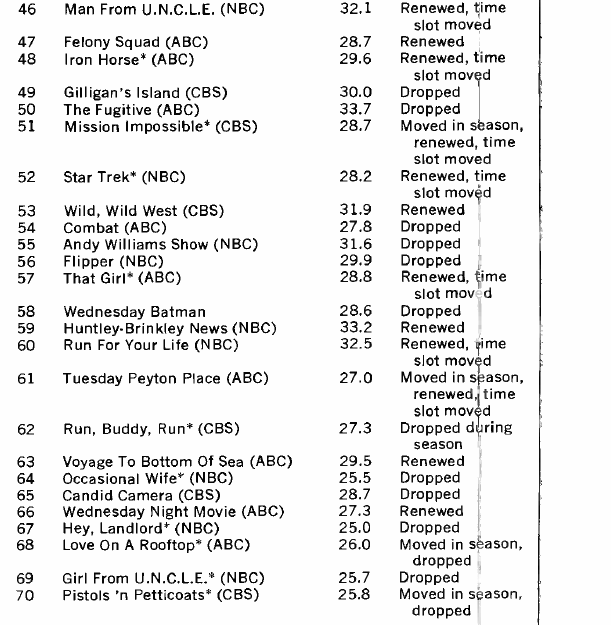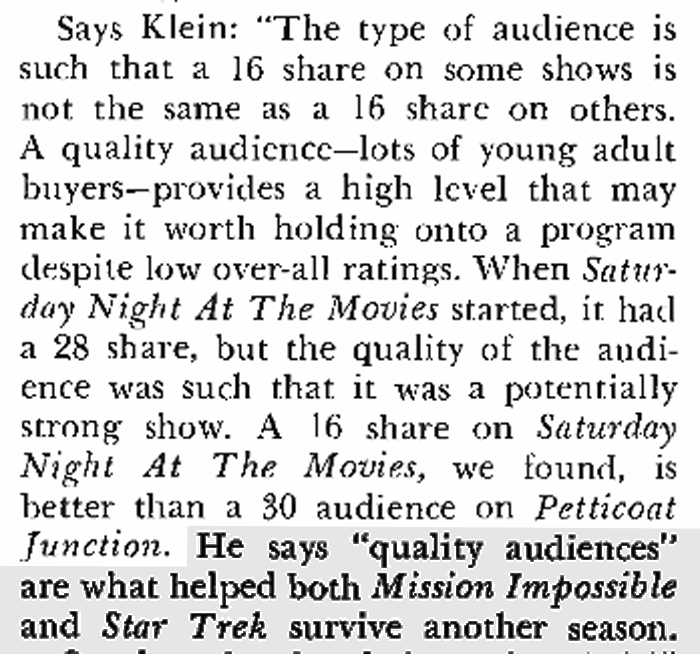Not sure about what a fourth season might have entailed, but your earlier points are well taken. GR's abrasive attitude towards NBC must have grated on them all the more because Star Trek wasn't a runaway hit by any measure, and was meanwhile expensive to produce. If GR had taken a more cooperative tact with NBC, trying to work with them, then they may have cut him more slack. But as Cushman's book points out, there was already a history of friction between him and NBC on "The Lieutenant," enough friction to get that show cancelled prematurely.
I've always wondered why Roddenberry was never able to get another non-Trek series on the air, when he had a number of good ideas that could have worked. I've now come to understand that it was just his difficulty getting along with others and inability to compromise with the networks. He actually got an order for a
Questor series, but chose to abandon it because he couldn't accept the changes the network wanted. Now, in his defense, he was absolutely right, because the changes would've gutted the show of its emotional core and turned it into the kind of derivative
Fugitive knockoff the suits wanted. But if he'd been more of a negotiator and less of a "my way or the highway" type, maybe he could've found a way to win them over.
I think Solow's departure, as well as the shifting of the series to a cost-conscious Paramount, meant the 'emperor (GR) was now naked,' so to speak. Along with those factors, NBC must have surmised that the second "Save Star Trek" campaign originated in GR's office.
It largely did, but it didn't have as much of an impact as Roddenberry claimed. The network was probably going to renew the show anyway; at least, there's no evidence that it was ever really going to cancel the show, just that the show was on the bubble for a while.
It's no wonder that Star Trek ended up on Friday nights at 10:00 for the third season. NBC wanted it dead as they were tired of GR's shenanigans. The only mystery is how it could have been originally slated for the Monday time slot that eventually went to Laugh-In. I personally think this was a case of intentional deception on NBC's part... and that they must have particularly enjoyed pulling the rug out from under him.
I don't think that's so. What laypeople tend to overlook is that the decision about whether to keep or cancel a show isn't just about that show in a vacuum -- it's about the network's entire programming strategy and how to create the strongest weeklong schedule. It's about how all the shows stand in relation to one another. Often a decision to promote a strong series will inflict collateral damage on other series that have to be shoved aside or cancelled to make room for it. So shows can be bumped to bad time slots or cancelled for reasons that pertain to entirely different shows.
For instance, one of the strongest and most acclaimed shows on the fledgling FOX network back in '89 was
Alien Nation, and the network really liked that show and wanted to keep it around. But at the time, FOX was only airing programming a few nights a week, and they wanted to add more nights, to produce more programming. And their bean counters determined that they could produce four sitcoms for the same amount of money they spent on
Alien Nation. And so AN was cancelled. They didn't want to cancel the show -- indeed, they kept working with the producers for years trying to find a way to bring it back, and eventually did revive it as a series of TV movies -- but they decided they had to, for reasons that weren't about the show itself but were instead about the overall strategy of the network as a whole.
So I doubt they moved Trek out of the Monday slot solely to punish GR. More likely they decided that they had another show that could perform more strongly in the Monday slot, a show they wanted to promote for the overall good of the network. ST was just one of dozens of shows they had to juggle and find the best places for, and it just ended up being one of the leftovers, one that had to settle for a weak time slot because the better-performing shows ended up with the strong ones.



